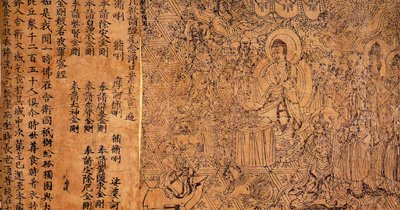Fazang's mysterious Prasena
Dong Li from Shaaxi History Museum has published an interesting paper in China Archaelogy and Art Digest, Vol.4 Number 4, April-May 2002 (Synopses covering the period October-Dec. 1999). This paper is translated into English by Bruce Gordon Doar. It is intitled "Suspicions regarding what are alleged to be Sui Dynasty glass and agate Weiqi Chess piece".
In this paper, the author brightly demonstrates how 27 conical small pieces, believed to be Weiqi pieces, are more probably Shuanglu pieces. Shuanglu was the Chinese version of Nard, an early form of Backgammon. In his paper, Dong Li wrote the following: An independent work by the Tang master Dharmakara (Fazang) titled Fangang fazang shu describes the game of prasena (sanskrit word) : "Prasena was a MILITARY game played in the Western Region (Central Asia), and two players each have more than twenty small jade TOKENS which serve as ELEPHANTS and HORSES and these must take strategic command of ALL ROADS on the board".
For Dong Li, Prasena is synonym of Boluo Saixi, which is another mystery as it seems to have meant a variant of Liubo without dice in Han times and a synonym of Xiangqi in Song times. But was did it mean in Tang times? In my opinion, this description better fits with a Chess-like game than a Backgammon-game.
Fazang, living 643-712, was a Buddhist monk and theorician, one of the founders of the Bouddhist school of Huayan. This school has rich hours under the reign of the dreadful empress Wu Zhao (a.k.a Wu Zetian). Born in Chang'an, the Tang capital, the interesting fact is that Fazang was an emigrate: he was a sinised Sogdian, then with origins in the Samarkand area on the Silk Road.
Fazang's work is also titled: Fanwang fazang shu, "Comment of the Fanwang jing by Fazang".
The Fanwang jing was an important
Buddhist text from the end of the 5th c. AD. Its other
name is the Sutra of Brahma's Net. Its 33rd
precept (On Watching Improper Activities) says:
"A disciple of
the Buddha must not, with evil intentions, watch people
fighting or the battling of armies, rebels, gangs and
the like. He should not listen to the sounds of conch
shells, drums, horns, guitars, flutes, lutes, songs or
other music, nor should he be party to any form of
gambling, whether dice or games. Furthermore, he should
not practice fortune-telling or divination nor should he
be an accomplice to thieves and bandits. He must not
participate in any of these activities. If instead, he
intentionally does so, he commits a secondary offense.
"
This sutra is inspired from the Daban niepan jing (Sutra of Nirvana, translated about 415-420) which says more or less the same thing. This is a recurring precept in Buddhist thoughts since the Vinayapitaka (4th or 3rd c. BC.).
Here, it seems that Fazang was explicitly addressing another game.

DISCUSSION:
If this Prasena is a Chess game, then it would be its very first trace in China, where the first undeniable reference for the Xianqi is the Xuanguai lu (‘Tales of the obscure and peculiar’) written by the Tang Minister of State Niu Sengru (779-847).
That means that:
- a military game was played (in Chinese garnisons?) in the Western provinces before 712, with Elephant and Horse -> those are found in both Persian/Indian Chess and Chinese Xiangqi.
- it was advised to control all roads, this is more the case for Xiangqi where the General is confined inside his palace and can be checked by the opposite General if he is put on the same line.
- it used token, like in Xiangqi, and not 3D carved piece like the Afrasiab Persian set (providing that Dong Li's TOKEN is a correct rendition).
- it seems that it was not known outside the Western provinces, so not well known in main China.
For these reasons, I consider very seriously that this Fazang's Prasena could be the first evocation of a proto-Xiangqi, directing its birth area towards the West, on the Silk Road oasis citadels.
A recent paper from Andrew Lo * confims and repeat this point also said by Dong Li: they refer to Yan Shu (991/993-1055) saying (in his Lei yao): "The game of shuang lu originated in Tianzhu (India), and this is the game of bo luo sai (prasena) noted in the Niepanjing (Nirvana sutra). In the Wei Dynasty of the Three Kingdoms period, during the years of the Huangchu reign (220-6), it came into China". Andrew Lo then adds: "The game of bu luo sai needs further research, but from a few primary Buddhist sources quoted by scholars, it seems to refer to a chess game".
We also know that the monk Yuxian, writing between 1131 and 1162 described the Po Luo Sai game, thus named from a Sanskrit term meaning troops, i.e. the game of troops. He said that this game has lines drawn on a board, separated in the middle by a river, and each side having 16 pieces: soldier, catapult, chariot, horse, elephant, etc. He added: "it is commonly known as Xiangji (Xiangqi).
If you have more information, ideas, ..., do not hesitate to contact me. Thanks.






